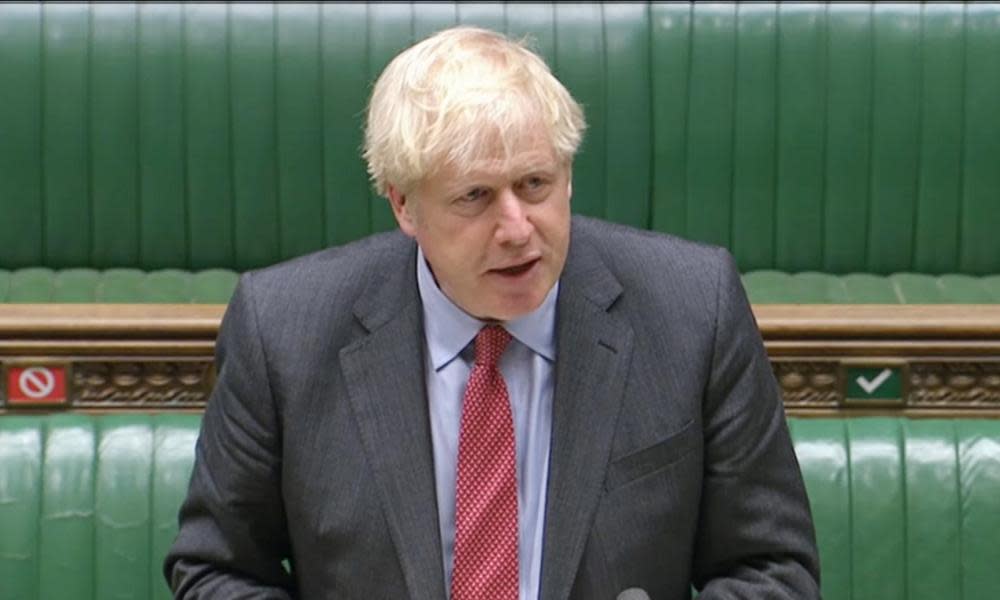What are the new coronavirus rules in England?

Boris Johnson has announced a series of new, more robust coronavirus restrictions to come into force across England in a speech to parliament, to be followed by a TV address on Tuesday evening. These are the key points of what he told the Commons.
What are the main changes?
• People who can work from home “should work from home”, the prime minister said, although where this was not possible, such as with construction and hospitality, staff should still attend their places of work as usual. This takes effect immediately.
• From Thursday, pubs, bars and restaurants can only operate via table service, apart from takeaways, and must close by 10pm, although deliveries can take place later.
• All taxi and minicab passengers must wear masks, as must all retail and hospitality staff, and hospitality customers except when they are seated to eat or drink. Businesses that breach the rules could be fined or closed down.
• Some exceptions to the “rule of six” social distancing regulations will be tightened up. From Monday, weddings and wedding receptions will be limited to 15 people, although funerals can still have 30. Adult indoor team sports will no longer be allowed.
• Plans to trial limited live audiences next month, for example at sports events, are being shelved.
• There will be stricter enforcement of the rules, with extra funding available for police and local authorities. Individual fines for first-time breaches will double to £200.
Is this a new lockdown?
No, and Johnson was keen to stress this, saying the rules were a “delicate balance” between limiting coronavirus infections and not overly harming the economy.
However, this does not mean a full, national lockdown has been ruled out. If the revamped rules fail to reduce Covid-19 infection rates, Johnson said, the government “reserves the right to deploy greater firepower, with greater restrictions”.
How long will it last?
No one knows. But having predicted only weeks ago that the UK could be close to normal before Christmas thanks to the “moonshot” plan for mass testing, Johnson said people should expect these rules to last for perhaps six months, “unless we palpably make progress”. He added: “For the time being this virus is a fact of our lives.”
default
What’s happening in the rest of the UK?
That is a matter for the devolved governments. But having held talks with leaders in Scotland, Wales and Northern Ireland, Johnson said he expected them to take similar steps.
Why has the government done this?
Johnson was blunt about this. The country, he said, faces “a perilous turning point”, with daily coronavirus infections almost four times higher than a month ago, and the “R” rate for reinfection well above one.
The PM referred to Monday’s briefing by the government’s two top medical and scientific advisers, which warned that without robust action, the UK could be experiencing about 50,000 new Covid cases a day by mid-October, and about 200 deaths per day a month after that.
With the Covid alert level raised from 3 to 4, meaning a potentially exponential rise in infection, Johnson said: “This is the moment when we must act.”
What efforts did he take to mollify lockdown sceptics?
Johnson repeatedly assured the doubters, a number of whom sit on the Conservative benches, that he was seeking “the maximum reduction in the R number with the minimum damage to livelihoods”, and apologised for the impact on hospitality businesses.
He also offered MPs “every opportunity” for parliament to scrutinise the decisions, promising regular briefings with government scientists. The PM also stressed his dislike at having to “stifle our freedoms”.
What was the reaction?
The Labour leader, Keir Starmer, said he backed the plans, but criticised the government for its failings in areas such as testing and a lack of consistent leadership. There was also some mild initial pushback from Tory former ministers, with Jeremy Hunt calling for more efforts over testing, and Greg Clark questioning why MPs did not have the chance to debate the measures before they were announced.


